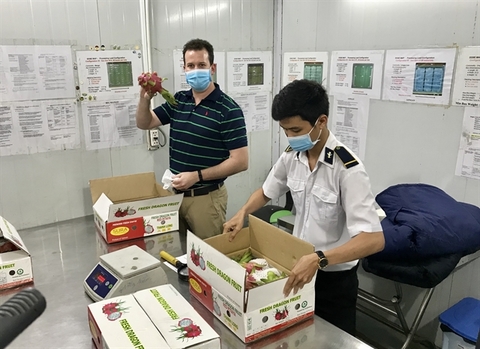
Tim Westbrook (left), an inspector at the US Animal and Plant Health Inspection Service, at the Son Son Irradiation Company in HCM City’s Binh Tan District. — VNS Photo Bo Xuan Hiep
Viet Nam will continue to work with the US to mitigate challenges related to its export of fresh fruits to the latter, which has recently been disrupted due to the COVID-19 pandemic, an official told a press conference in HCM City on Friday.
Dr Hoang Trung, head of the Plant Protection Department, said the department would work with the US Animal and Plant Health Inspection Service (APHIS) and the US embassy to take measures to prevent export disruptions due to the pandemic.
Viet Nam resumed exports of fresh fruits to the US recently after an interruption since early August due to the pandemic.
Because of the outbreak, APHIS personnel stationed in Viet Nam returned home in March, resulting in a stoppage in irradiation and inspection of fruits.
After the APHIS staff returned home, the US embassy was authorised to monitor the irradiation, but it worked very few hours a day and then, since August 7, completely stopped the work.
Exports stopped as a result.
Pen Petlock, a representative of the embassy, said the US mission has worked with the Plant Protection Department under the Ministry of Agriculture and Rural Development to bring Tim Westbrook, an inspector at the US Animal and Plant Health Inspection Service, to Viet Nam to continue with an on-going pre-clearance programme.
Westbrook said the programme has been in place since 2008 which exports fresh fruits from Viet Nam to the US.
Under the programme, Viet Nam exports six varieties of fruits to the US - dragon fruit, rambutan, longan, lychee, star apple, and mango - worth around US$20 million a year.
It uses cutting-edge food irradiation technology and a range of plant pest safeguard standards and protocols, he said.
Last year Viet Nam exported seven million kilogrammes of fruits to the US through the programme, he added.
APHIS is an agency under the US Department of Agriculture that supervises the irradiation process at the Son Son Irradiation Plant in HCM City’s Binh Tan District, the only such plant certified by the US in Viet Nam.
Besides the US, some other markets like Australia and New Zealand also require irradiation for exporting fruits, but in the absence of more irradiation plants Viet Nam’s fruit prices are not competitive since fruits from across the country must first be transported to HCM City, which increases costs, experts said.
The US remains the second largest importer of Vietnamese fruits and vegetables after China.
While Viet Nam’s fruit exports to the market have grown steadily, they only account for a small proportion of demand.
According to the Ministry of Agriculture and Rural Development, despite the pandemic, Viet Nam’s exports of fruits and vegetables to the US in the first seven months of this year rose by 9.8 per cent year-on-year to $77 million.
Last year they were worth $150 million after rising by 7.2 per cent. — VNS